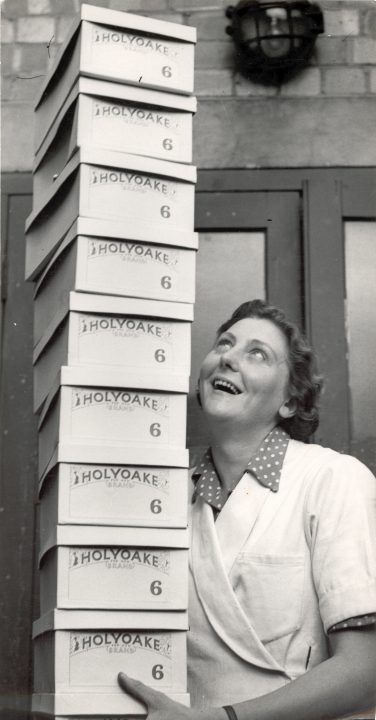This year, Co-op News turns 150, and our celebrations include a series of articles looking at our life and times. This month, Gillian Lonergan looks at our links with George Jacob Holyoake, a legend of the co-op movement …
Born on 13 April 1817, the son of an engineer, George Jacob Holyoake began his working life as a very young child helping his mother make horn buttons at home. When he was old enough, around the age of eight, he was apprenticed as a whitesmith, working in tin – but took every educational opportunity open to him, attending lectures and evening classes. His ability as a speaker was soon recognised and he became a Social Missionary, employed to travel the country disseminating the ideas of Robert Owen and other socialists.
In 1842 he fell into a trap at one of his talks, landing him six months in prison – the last person in Britain to be imprisoned for blasphemy during a public speech. He was talking about the Owenite communities and a member of the audience asked what place God had in these communities.
Holyoake, not being religious, made reference to the armed services being put on half pay, because the country was at peace and they were not needed; he suggested that God could be put on half pay. Religious groups were keen to prosecute those advocating atheism, and Holyoake was arrested.
He was not allowed to speak during his trial as non believers could not swear the oath, but after sentencing, he was invited to speak – and did so for about seven hours without a break.
His work on co-operatives took over his life: he was one of the organisers of the 1869 Co-operative Congress which led to the formation of the
Co-operative Union (now Co-operatives UK) and also of the 1895 International Congress, where he proposed the resolution formally establishing the International Co-operative Alliance.
Today, Holyoake is probably best remembered for his huge body of writing. He went into business with one of his brothers, Austin, as a publisher, which enabled him to edit a number of periodicals, such as the Reasoner, as vehicles to spread ideas.
He was prominent in the campaigns to remove tax on newspapers, known as the “Tax on Knowledge”, which made them too expensive for working people – one of the reasons that co-operative society reading rooms and libraries were so important during the early years of the movement.
The Co-operative News owes a great deal to Holyoake, who wrote its original prospectus and included full page advertisements for it in the Reasoner every week. The first of many articles by him – under the pen name “Our Special Commissioner” – appeared in the second editions. Holyoake always called himself a journalist and his motive for writing was as much to inspire others to set up co-operatives as to document the development of the movement.

His history of the Rochdale Pioneers, Self Help by the People, was written 25 years after the opening of the first store in 1844 and within a couple of years had been translated into French, German and Russian with other languages following – spreading the work of the Pioneers around the world.
His talks at the funerals of eminent co-operators were often published in the Co-operative News and give fascinating insights into their personal characteristics as well as their achievements. In 1902, his talk at the unveiling of the ornate railings around the tomb of Robert Owen in Newtown adapted Shakespeare to begin with the words “We come to praise Caesar not to bury him”.
In 1887 he was invited to preside at Congress, an acknowledgement of his contribution to the movement. His inaugural address contrasted the grim struggles of the workers he had seen during his youth with the lives of workers benefiting from the co-operative movement. He did not steer clear of controversy, including the much-debated topic of the time, Bonus to Labour; he felt that workers in co-op factories should receive a share of the profits.
Holyoake’s legacy exists today in ideas, bricks and mortar, and the organisations that he helped to found. He was, above all, an optimist: he knew how much co-operators could achieve by working together and set about encouraging them to do so.
For decades, co-operative footwear factories made Holyoake Brand shoes. In several towns in the UK, there is a Holyoake Street of houses built by co-operators for their members. Best known is Holyoake House, the headquarters of Co-operatives UK, in the centre of Manchester. The construction of Holyoake House was suggested as a memorial just after his death on 22 January 1906, and co-operative societies contributed to the work. The original brief included meeting rooms so that co-operators could come together to exchange ideas and a library where they could carry out research.
He is also commemorated with various accounts of his life. The film Men of Rochdale, produced by the CWS for the Rochdale Pioneers’ centenary in 1944, begins with Holyoake saying “I have cared more for co-operation than any other cause”. In 2012, Co-operative Revolution – a graphic novel by Polyp – was published for the International Year of Co-operation, with Holyoake given a starring role, looking to the future as well as the past.
Another account of his life comes from Holyoake himself, with his autobiography Sixty years of an Agitator’s Life. It is a title he lived up to: despite frequent ill health which affected his eyesight and made his daughter, Emilie Holyoake Marsh, indispensable as his secretary, he continued to write, give talks and attend the co-operative congress until the end of his life.
His new year address to the Co-operative News a couple of years before his death was rightly described as being from the GOM – the Grand Old Man of the Co-operative Movement.